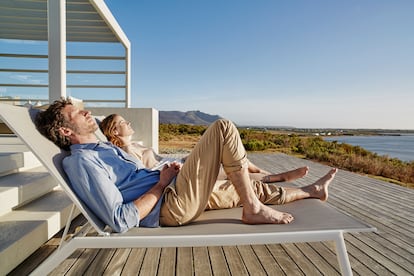‘Leisurephobia,’ or when doing nothing is the hardest task
On vacation, some people feel guilty or stressed by the prospect of an empty schedule, and they fill all their free time with tiresome activities when they could, and should, be relaxing

Staring at the horizon as the waves roll in. Gazing into space amidst the mountains. Lying in a hammock, swaying peacefully. These are all pleasant activities – in theory. However, for some people they can be sources of stress. Psychologist Rafael Santandreu calls this state of feeling tense in relaxing situations “leisurephobia.” “There are people who are afraid, terrified, of having nothing to do. They become anxious. They would much rather be busy all day. Some are psychologically ill; they don’t want to stop because then they have more time to overthink, to make themselves more miserable. There is a fear of stopping and facing your own mental disaster,” explains the author of El arte de no amargarse la vida (The art of not making your life miserable).
Although these cases may be extreme, the reality is that “for the modern adult, doing nothing is much harder than having a full schedule,” says Santandreu. This, on vacation, can be translated into endless activities to fill the time, to the point of reaching the end of the summer almost as stressed, if not more, as one was at the beginning.
“With the inertia that we have, it is more difficult to slow down, stop and do nothing, than to continue with our usual work routine. Also, in part, I guess this way we feel that we’re useful, that we’re not wasting time, which is the key and the trap,” adds writer Azahara Alonso. In her latest book, Gozo, a hybrid of a novel and an essay, she makes the case for laziness and the pleasure of doing nothing. She also addresses a feeling that can arise in those moments of rest: guilt. “I really like to distinguish between doing absolutely nothing, which is very difficult, and doing whatever we want. Which also differs from what is expected of us. In either case, there is indeed a guilt, which has become systemic. We are not producing, we are not complying with the established mandates,” explains Alonso, who is also a philosopher.
Alonso points out that the guilt is not felt when doing tourist activities because then one is “filling time,” which is what a person is expected to do. She alludes to a reflection by photographer Susan Sontag: “She says that the societies that are traditionally the hardest-working are also the ones that at first, when they traveled, used to take more pictures, because they put the camera between them and the world in order to be busy with something; otherwise it seemed that they weren’t doing anything and that the trip made no sense,” she explains.
Psychologist Mireia Cabero, who teaches at the Open University of Catalonia, agrees with Alonso’s opinion on guilt. “We place so much value on being useful, productive, contributing and committing ourselves, that we forget that pause, serenity, contemplation, getting bored and doing nothing are also useful, healthy and organically and socially necessary. Everything responds to different needs: economic and social the first ones, self-care the second ones. And even though the first ones seem to matter more because they are associated with social success, they are worth exactly the same as the second ones. And only when the second ones are well consolidated, we add value and high performance in the first ones,” she points out.
When you are lying down doing nothing and the idea that that time could be better spent doing some activity enters your brain, you should keep in mind that “thoughts are a neural suggestion that you can listen to or not, and you have to feel free to decide. Think about what you really want. A thought is not an order. However, we usually don’t realize this, because we relate to that voice in our mind, so whenever a thought pops into our head, we simply don’t question it. And it happens that, by fully believing that thought, guilt arises, which is an emotion that comes from a wrong thought,” says Úrsula Calvo, a successful businesswoman who found a solution to her stress in meditation and is now an expert in mindfulness.
Calvo explains that the human brain “doesn’t understand” that a person can spend 30 days doing nothing, without having to farm or go hunting; and when it does not have an activity to focus on, it goes into “boredom mode.” To reverse this circumstance and appease that mental activity it is necessary to train the mind with meditation or mindfulness.
Santandreu maintains that this need to be constantly doing something is an evil of our society. “In the hunter-gatherer villages of the Amazon, for example, people work very little, one hour a day, in which they get everything they need for sustenance. The rest of the time is spent at leisure. They visit other villages, spend time with the children, do crafts or spend countless hours talking.”
Without reaching those levels, the psychologist advises taking advantage of the holidays to slow down and do your daily activities “at a third of the normal pace.” For example, spend more time eating breakfast, or slow down when you walk. This slowing down, he states, introduces the person “into a kind of calmness and comfort.”
In this regard, Cabero adds that at the beginning of their vacation, people find it harder to assume, accept and allow themselves to slow down than to continue with the demanding pace of their activities. “We’re coming at top speed; we need the reasonable braking time to get going again,” she exemplifies.
For Calvo, there is a kind of inertia that drives us to constantly try to fill our life. “Because we have the feeling that when we stop doing, we stop being. It’s as if life was empty without constant activity. So what happens? That we go on vacation and we don’t switch modes. We continue with the same mechanics. Instead of filling our schedule with meetings, we fill it with activities, which appear to be a lot of fun, but, in the end, when you don’t really allow yourself to rest, it can be exhausting.” She states that there is no need to fill up every time slot when you can simply be at ease, watching a sunset, enjoying an after-dinner conversation or just sitting in the shade. “It’s very rewarding, but we don’t realize it.”
Santandreu challenges people to enjoy their leisure time without having to fill it with activities. “Knowing how to do nothing can be considered a sign of mental health,” concludes the psychologist.
Sign up for our weekly newsletter to get more English-language news coverage from EL PAÍS USA Edition
Tu suscripción se está usando en otro dispositivo
¿Quieres añadir otro usuario a tu suscripción?
Si continúas leyendo en este dispositivo, no se podrá leer en el otro.
FlechaTu suscripción se está usando en otro dispositivo y solo puedes acceder a EL PAÍS desde un dispositivo a la vez.
Si quieres compartir tu cuenta, cambia tu suscripción a la modalidad Premium, así podrás añadir otro usuario. Cada uno accederá con su propia cuenta de email, lo que os permitirá personalizar vuestra experiencia en EL PAÍS.
¿Tienes una suscripción de empresa? Accede aquí para contratar más cuentas.
En el caso de no saber quién está usando tu cuenta, te recomendamos cambiar tu contraseña aquí.
Si decides continuar compartiendo tu cuenta, este mensaje se mostrará en tu dispositivo y en el de la otra persona que está usando tu cuenta de forma indefinida, afectando a tu experiencia de lectura. Puedes consultar aquí los términos y condiciones de la suscripción digital.









































